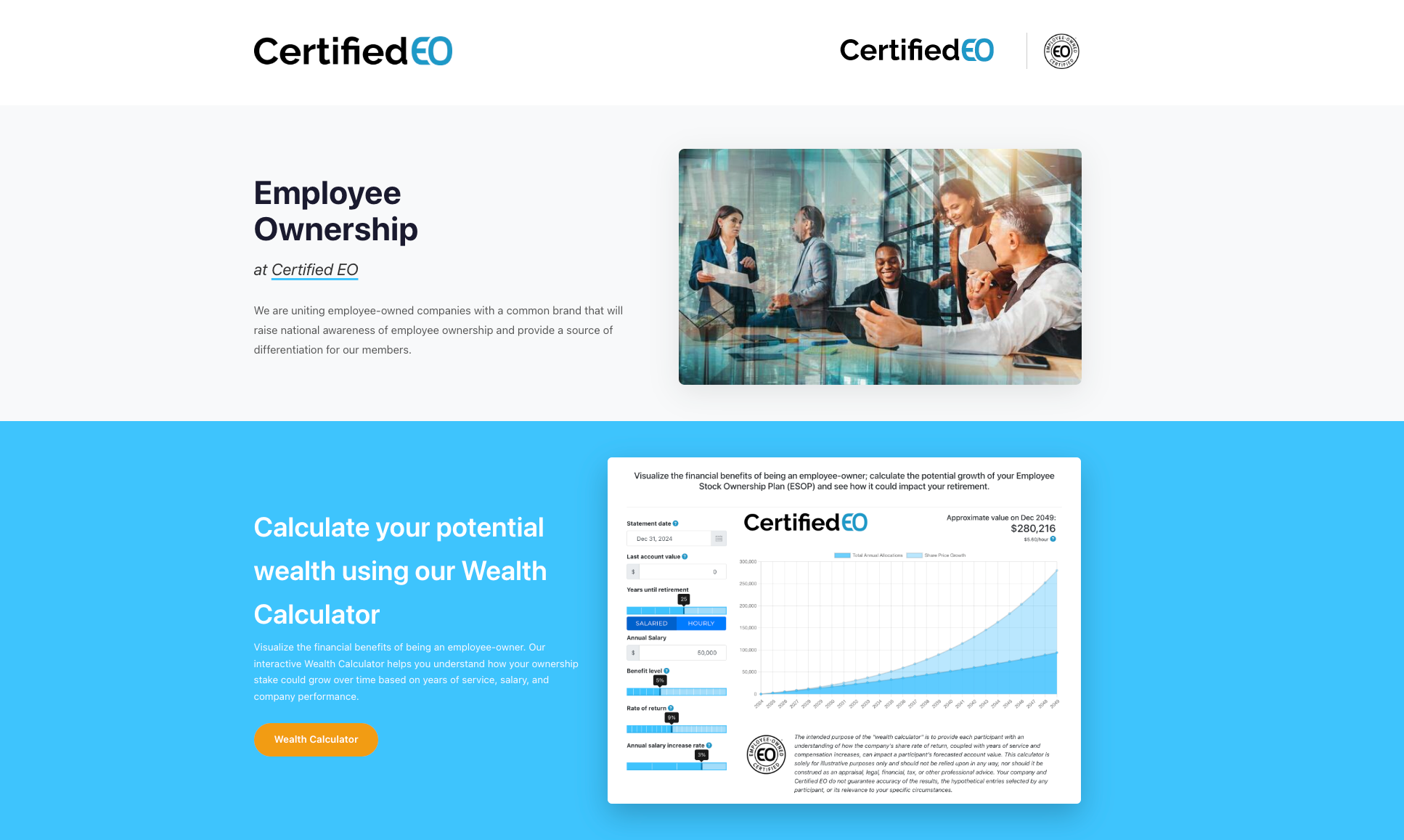
Only 1 in 200 American companies are employee-owned. That means employee ownership can be an unfamiliar concept for most American workers, especially those new to the workforce.
Companies that are employee-owned can struggle to convey the real benefits of employee ownership to their younger workforce. Ironically, young employees often have the most to gain from employee ownership both financially and culturally.
So how can companies unlock the engaging power of employee ownership with this tough audience? The key lies in framing employee ownership so that it resonates with younger workers' priorities today instead of focusing on a distant future.
The Problem: Employee Ownership Can Feel Abstract
Employee Stock Ownership Plans (ESOPs) are often discussed with employees as retirement benefits. Technically, an ESOP is a retirement plan, so the connection is logical and the communication naturally centers on saving for the distant future.
But for young professionals, the concept of "retirement" may seem abstract. They’re usually focused on more immediate goals, such as paying off student loans, purchasing their first home, finding a partner, or starting a family.
In addition, job-hopping is more common in the modern economy. Many younger employees don't know how long they will stay with their current employer. An ESOP that's framed as a retirement plan may not feel like a priority or enough motivation to stay at a job.
As employee ownership is relatively uncommon, younger workers may not comprehend the benefits of working at a company that follows this model. If none of their peers have experienced this environment, it’s harder for them to see how they could benefit. It’s just too abstract.
How Employee Ownership Benefits Younger Employees
While it’s true that the financial benefits of employee ownership take time to build, many other aspects of this model appeal directly to the needs of younger employees. Here’s how companies can better communicate the value of employee ownership to the next generation:
1. A unique workplace culture with ownership from day one
All employees immediately benefit from the unique workplace culture fostered by employee ownership. There are tangible day-one benefits to working at a business that has an employee ownership model.
Employee ownership motivates employees to take charge of daily work decisions and gives them a sense of shared responsibility. For younger professionals, this ownership culture can provide a sense of belonging and purpose from day one. They can witness how invested employee-owners are in the company's success and how they work together to achieve goals.
2. Growth opportunities without job-hopping
Many young professionals feel the pressure to change jobs often to advance their careers. Staying too long at one workplace can be viewed as stunting your professional growth and income.
Employee-owned companies are different because they provide a stable job environment that rewards tenure. There are more opportunities for skill-building, professional development, and career growth than at traditional companies. Employee-owned companies value managers who understand the unique model, so they’re more likely to promote from within. For young workers, employee ownership is an opportunity to experience personal and professional growth without jumping from job to job.
Studies show that employee-owners tend to stay at a job longer than their peers at traditionally structured companies. The stability that comes with employee ownership means that younger employees can experience upward mobility while staying in one place. They can build long-term relationships with coworkers and customers and grow with their company, accumulating knowledge, experience, and equity.
3. Harnessing the power of compound growth
The financial benefits of employee ownership and its role in building long-term wealth are undeniable. But while younger professionals may not feel the urgency of preparing for retirement, they actually stand to gain the most from an ESOP. As with any form of investing, time is a powerful ally.
The longer an employee-owner stays with the company, the more shares or stock they accrue. Over time, the value of those shares can grow significantly through the power of compounding. On top of that, employee-owners generally hold shares in a private company, a form of ownership that can often outperform publicly traded shares, although results are never guaranteed.
As Warren Buffett – investor, businessman, and chairman of Berkshire Hathaway – famously said, “The stock market is a device for transferring money from the impatient to the patient.”
What Buffett and other legendary investors have long understood is that time in the market – or in this case, time in the employee-ownership plan – can yield life-changing results.
For young professionals, joining an employee-owned company is a real opportunity to build wealth. According to our analysis of Federal Reserve data, if every American business were to become employee-owned, median household wealth would increase by over $100,000.
Framing Employee Ownership for the Next Generation
In order to effectively engage younger workers in the concept of employee ownership, organizations must adapt their messaging. Instead of focusing solely on retirement benefits, they should highlight the unique cultural advantages, the opportunities for personal and professional growth, and the long-term financial potential of employee ownership.
Employee ownership offers younger workers stability, meaningful work, and a sense of purpose. While the long-term financial rewards might not be front-of-mind for someone new to the workplace, framing employee ownership as a way to build long-term wealth while experiencing career growth is a powerful message.



